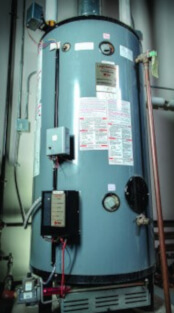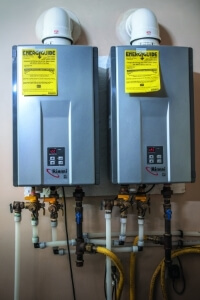Propane Gas Water Heaters

Water heaters available today are by far superior to those available in the past, regardless of the fuel used. Modern propane water heaters have made great advances in design and technology to become the primary water heating choice for consumers outside natural gas service areas. LP Gas water heaters available today include standard "tank type" water heaters with capacities ranging from less than 40 gallons to larger units holding more than 100 gallons. As the move to cleaner and greener fuels becomes the standard, water heaters are now available in space saving models that consist of a tankless design, thus cutting down on fuel consumption and decreasing emissions as propane is only used as hot water is used. Tankless water heaters are also known as instant hot water heaters and on demand hot water heaters whereas tank type water heaters are still referred to as standard "water heaters". The picture to the left shows both types of water heaters, tankless and the standard tank type and are labeled as such.
Tank Type Propane Water Heaters
Tank type propane water heaters have been around for decades and can be purchased almost anywhere. Water heater installation services are also commonly offered through the same retailers that sell them as the installation of any propane appliance should be conducted by a professional. Also, propane water heaters require plumbing connections, pipe and fittings for both water and propane gas. Tank type water heaters use a large internal container (tank) to hold the heated water prior to use. Propane heats the tank from the bottom of the unit and in turn, heats the water inside to a temperature set by the user via a thermostat. The temperature in a standard tank type water heater is kept at a constant temperature regardless of hot water demand and use. For instance, if the thermostat on a forty gallon water heater is set to 130 degrees and hot water is not used or needed for 5 days, a forty gallon supply of water is available at 130 degrees for five consecutive days. This use of gas while the water heater isn't in use is called a standby heat loss and is extremely inefficient. However, compared to most other fuels, propane is still a more cost effective water heating solution.
Installation of standard tank type propane water heaters are subject to space and location limitations with specific venting provisions detailed in NFPA 54. In fact, most water heaters today come with two separate manuals for installation. One covers the installation and the second details the venting requirements.
Tankless Propane Water Heaters

Propane tankless water heaters are increasingly becoming the chosen type of water heater for a number of reasons. The main reason being that they are much more efficient in their use of gas. Their increased efficiency revolves around the fact that tankless water heaters only heat water as demanded. They don't even use any gas until a downstream water fixture opens the hot water valve. This means that periods of inactivity consume no gas and produce no emissions. Therefore, tankless water heaters are more cost effective as well as being much more environmentally friendly.
The tankless water heater operates similar to an air conditioner where air is cooled as it is blown across coils containing refrigerant and then circulated through the duct system, cooling the indoor area. In a tankless propane water heater, water enters the unit and travels through "coils" that are heated by a propane fired burner to a preset temperature. The hot water then travels to the tap for use until the tap is closed at which point the heater shuts down, sensing that the flow of water has stopped. Tankless water heaters are self contained heat exchangers utilizing technology that operates by sensing downstream demand, automatically adjusting as demand varies, and turning off as hot water is no longer needed.
Tankless Vs. Tank Type Water Heaters
Propane water heaters can deliver the same desired supply of hot water regardless of whether the unit is tankless or standard. The cost for units are quite different with tankless water heaters costing up to twice that of standard water heaters. However (a big however), the savings associated with tankless water heater operation is where the on demand water heater becomes a more viable option. Depending on use, tankless water heaters can pay for themselves in a matter of months. A distinct advantage that tankless water heaters have over tank type water heaters is the fact that tankless heaters take up much less space than that required by even a small, 20 gallon unit. Because of the compact design, tankless water heaters can be installed on an interior wall and vented directly to the outside adjacent the unit. Other tankless models allow for exterior installation or even installation within the wall providing a flush, less noticeable water heater installation.
